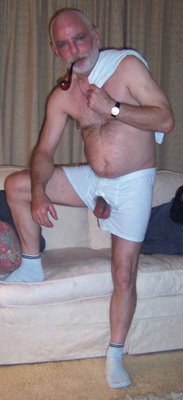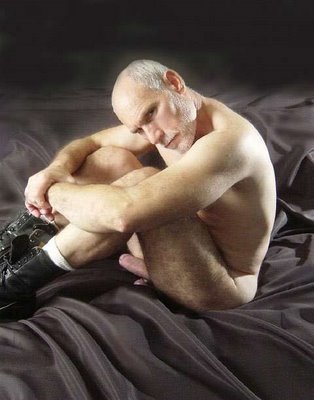 Jack Norris and Seymour Sirota feared ending up like a lot of older gay men they know — no children, partners dead or gone, families estranged, little to do but sit in their New York City apartments hoping the phone rings.
Jack Norris and Seymour Sirota feared ending up like a lot of older gay men they know — no children, partners dead or gone, families estranged, little to do but sit in their New York City apartments hoping the phone rings.The couple tried retiring in Tampa but never felt comfortable there. They considered Sun City Center, Fla., until they heard about gay men who had moved in and promptly fled back into the closet. "We didn't want to go that route, not at this point in our life," Norris says.
RainbowVision, the nation's first retirement village aimed at gay men and lesbians, seemed a perfect fit. A visit to arts-happy Santa Fe, a high-desert cultural oasis with a gay-friendly reputation, sealed the deal. They put their Tampa place and Upper West Side co-op on the market.
Moving to a new $361,000, three-bedroom condo put Norris, 67, and Sirota, 79, on the leading edge of an emerging niche in the USA's booming retirement market. Communities tailored to gay seniors have been a dream, gay advocates say, ever since the gay-rights movement was born after the 1969 Stonewall riot in New York's Greenwich Village, a clash of police and drag queens after a raid on a gay bar.
But only recently have projects gotten off the ground: all-inclusive places like RainbowVision; conventional subdivisions that market homes or lots to gays; non-profit urban ventures that include affordable housing; and hybrids of all three.
A few have acquired land and are moving forward, says the American Society on Aging, including subdivisions in Pecos, N.M., and Zionville, N.C., urban condos and apartments in Boston and Los Angeles, and a lodge with cottages, town houses and nursing units in Santa Rosa, Calif.
Palms of Manasotas in Palmetto, Fla., the first to pitch retirement housing to gays in 1997, is in Phase 2 of constructing condos and single-family houses.
RainbowVision, 146 condos and rental units on 13 acres, opened with a party June 10. Twenty or so singles and couples already had moved in as "El Centro," the village's amenity-laden social center, got finishing touches.
Residents can eat in El Centro's cafeteria, work out in the Billie Jean King Fitness Center & Spa, book a massage, take a yoga or Pilates class, soak in a hot tub, sign up for physical therapy and acupuncture, or treat themselves to facials.
There are art studios, meeting rooms, a lounge and cabaret. Assisted-living apartments on the top floor are an option when residents grow frail but don't want to leave.
RainbowVision is sold out with a waiting list. It has attracted middle- and upper-middle-class gays from across the country. Its gay-owned development company is building a second, larger project in Palm Springs, Calif.
"People say, 'Why did you create a gay and lesbian community?' " says Joy Silver, RainbowVision's founder and president. "But nobody ever says, 'Why did you create a golf community?' So my question is, why wouldn't you have a gay and lesbian community?"
Gay senior communities don't exclude straights. Dina Rubinstein, a 90-year-old great-grandmother, picked RainbowVision after a long search. "I can't stand the regular retirement places," she says. "They're just for old people."
Limited options for gay seniors
The gay senior market is large, but no one knows quite how large. Census forms don't ask about sexual orientation. There are 37 million people 65 or older in the USA and 79 million baby boomers approaching retirement age. An estimated 2.9 million gay men and lesbians are over 55, according to SAGE (Services and Advocacy for Gay, Lesbian, Bisexual and Transgender Elders), a non-profit group that serves gay seniors in New York City.
Like straights, most gays tell surveys they want to grow old at home. RainbowVision and other gay projects appeal to perhaps 10% to 20% of retirees who'll spend their golden years elsewhere.
Either way, gays have different circumstances, advocates say. Almost 90% of gay retirees have no children, and nearly 80% have no partners, SAGE estimates.
Many gays in their 60s or older remain in the closet. "People forget they grew up in a time when every part of society believed gays and lesbians were immoral, suffered from mental illness, when the state outlawed our conduct," says Terry Kaelber, SAGE's executive director.
Legal barriers and social policy further marginalize gay seniors, says Kimberly Acquaviva, a nursing-education professor at George Washington University.
Same-sex partners are denied Social Security survivor benefits. Gay men and lesbians are taxed on 401(k) plans and IRAs that they inherit from partners. They pay estate taxes on jointly owned homes while married couples don't. When a married man or woman goes to a nursing home, his or her spouse can stay in their home. Same-sex partners don't have that right.
Older gays don't trust mainstream institutions, so they're less likely to seek services they need, including hospital care, Kaelber says. That, studies show, leads to higher rates of illness, substance abuse and depression, he says.
"Unfortunately, the gay and lesbian community has been very slow in responding," Kaelber says. "We tend to be youth-focused."
Few conventional retirement communities, assisted-living facilities or nursing homes are sensitive to gay lifestyles, needs and interests. They may not discriminate overtly, but they're not welcoming and inclusive, gay advocates say. In a 2000 study of New York City long-term-care facilities, 13% made sensitivity to sexual orientation part of staff training; 65% dealt with racial and ethnic diversity.
SAGE and other groups have developed programs to teach staffs in senior facilities to be as deferential to gays as other minorities. The training isn't widespread, and many institutions aren't receptive, Kaelber says.
When training deals with transsexuals and other gender non-conformity, sessions get "very electric," Kaelber says. "The gay man who likes to wear some makeup, the lesbian butch who wouldn't be caught dead in a nightgown, how do you treat them?" he says.
'Strong search for community'

Gay men and lesbians, often closer to gay "families of choice" than to their biological families, seek shared values and interests in retirement. "I find this very strong search for community," says Maria Dwight of Gerontological Services Inc., a market research firm in Santa Monica, Calif.
Her surveys identify a gay senior market that is younger — 60s, compared with 70s in traditional retirement communities — and better educated and more affluent.
Gay men and lesbians concentrate in large cities, and urban retirement projects are being built for them, with a twist: They'll also be neighborhood centers extending services to non-residents. Stonewall Audubon Circle, 66 condos in Boston's Fenway neighborhood, and a five-story development of 104 affordable rental units near Hollywood and Vine in Los Angeles, incorporate that model.
A similar development called Openhouse is planned in San Francisco. "The irony is that many gay people came here for a safe haven. Yet without housing services to support them as they age, they'll have to leave because it's so expensive," says Moli Steinert, Openhouse's executive director.
RainbowVision's Silver says retirement industry investors considered the gay market too risky when she was trying to bankroll her project. That's changing.
Aegis Senior Living, developer of 40 retirement projects mostly in California, is building its first for gay men and lesbians, Fountaingrove Lodge in Santa Rosa. "When we looked at the market demographics, it wasn't a stretch," egis president Dwayne Clark says.
Only 10 states ban housing discrimination based on sexual orientation, but opposition to gay projects is as likely to be over land use as bias. Two lesbians in Tallahassee, Fla., challenged a retirement village in 2003 over a policy of excluding same-sex couples and won. The women chose to live elsewhere.
Developer Bonnie McGowan says it wasn't homophobia but NIMBYism — not in my backyard — that united critics of her Birds of a Feather subdivision in Pecos. Opponents sued, lost, appealed to the state supreme court and lost again. "It was more about change," McGowan says.
RainbowVision move-ins confirm the desire for a place where, as Roger Bergstrom says, "I don't have to be afraid to hold my partner's hand and walk down the street."
A retired teacher from Arlington, Va., Bergstrom, 76, hid his sexual orientation until he left the classroom. He and his partner, Barry Baltzley, paid $327,000 for a three-bedroom condo. "When this place fills up, there will be more of a sense of family," Bergstrom says. "I've already met the type of people I hoped I would be living with."
from USA Today
No comments:
Post a Comment